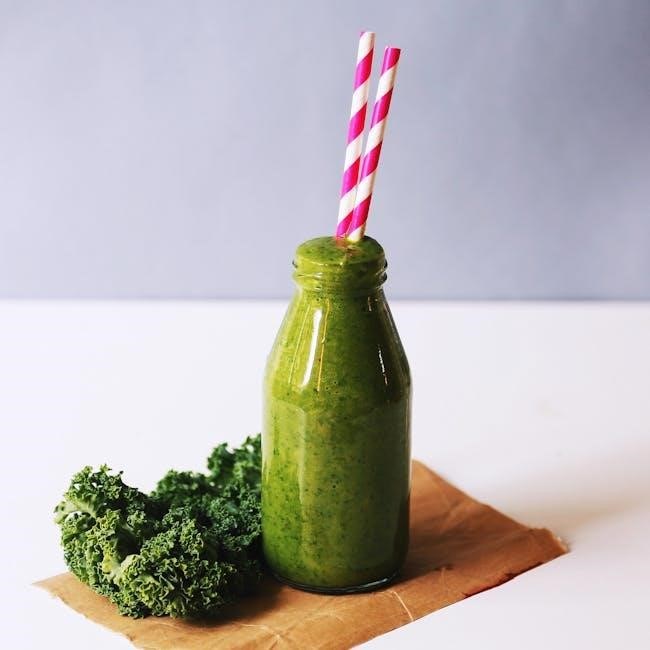
A diet for managing ulcers focuses on promoting healing‚ reducing discomfort‚ and preventing future sores through nutrient-rich‚ high-fiber foods that support digestive health and minimize stomach irritation․
Understanding the Role of Diet in Managing Ulcers
Diet plays a crucial role in managing ulcers by reducing stomach irritation and promoting healing․ Foods high in fiber‚ such as whole grains and vegetables‚ help protect the stomach lining‚ while avoiding spicy or high-acid foods can prevent discomfort․ A balanced diet not only aids in recovery but also helps prevent future ulcers․ Consulting a dietitian can provide personalized guidance‚ ensuring nutritional needs are met while minimizing symptoms and supporting overall digestive health․

Foods to Eat
A ulcer-friendly diet includes high-fiber foods‚ lean proteins‚ and low-acid fruits and vegetables․ These foods help protect the stomach lining‚ reduce acid production‚ and promote healing․
High-Fiber Foods for Digestive Health
High-fiber foods are essential for digestive health as they help regulate bowel movements and reduce stomach acid production․ Incorporate foods like oats‚ barley‚ apples‚ carrots‚ and legumes‚ which are rich in soluble fiber․ This type of fiber forms a protective barrier in the stomach‚ soothing the lining and preventing irritation․ A diet high in fiber also promotes the growth of beneficial gut bacteria‚ which can help combat harmful bacteria like H․ pylori‚ a common cause of ulcers․ Gradually increasing fiber intake ensures a gentle transition for the digestive system․
Lean Proteins to Support Healing
Lean proteins are crucial for healing as they provide essential nutrients without causing stomach irritation․ Opt for low-fat options like poultry‚ fish‚ or plant-based proteins such as beans‚ lentils‚ and tofu․ These foods are gentle on the digestive system and help repair tissues․ Avoid processed or high-fat meats‚ as they can trigger discomfort․ Incorporating lean proteins into meals supports overall health and aids in the recovery of the stomach lining‚ promoting a balanced and soothing diet for ulcer management․
Low-Acid Fruits and Vegetables
Low-acid fruits and vegetables are ideal for an ulcer diet as they minimize stomach irritation․ Opt for non-citrus options like bananas‚ melons‚ cucumbers‚ and leafy greens such as spinach and kale․ These foods are gentle on the digestive system and rich in essential nutrients․ Avoid high-acid choices like tomatoes‚ citrus fruits‚ and spicy vegetables‚ which can exacerbate discomfort․ Incorporating these low-acid options helps maintain a balanced diet while promoting healing and reducing ulcer-related symptoms effectively․
Foods to Avoid
Foods to avoid in an ulcer diet include spicy‚ acidic‚ and high-fat items‚ as they can irritate the stomach lining and worsen symptoms․ These foods can exacerbate discomfort and hinder the healing process․
Spicy Foods and Their Impact
Spicy foods can irritate the stomach lining‚ worsening ulcer symptoms and slowing healing․ They often trigger acid production and discomfort‚ making them best avoided during recovery․ While some people tolerate mild spices‚ overly spicy foods can exacerbate pain and inflammation․ Opting for bland‚ gentle flavors helps protect the stomach lining and promotes a smoother recovery process․ Reducing or eliminating spicy foods is a key recommendation in managing ulcers effectively;
Alcohol and Caffeine Consumption
Alcohol and caffeine can irritate the stomach lining‚ increasing acid production and worsening ulcer symptoms․ Both substances can delay healing and cause discomfort․ Reducing or avoiding these beverages is crucial for managing ulcers effectively․ While small amounts may be tolerated by some‚ complete avoidance is often recommended during the healing phase to minimize stomach irritation and promote recovery․ Consulting a healthcare provider can help determine safe consumption levels based on individual circumstances․
High-Fat Foods and Digestion
High-fat foods can slow digestion‚ increasing stomach acid production and irritating ulcers․ Fried foods‚ processed meats‚ and heavy sauces often trigger discomfort․ Reducing intake of these foods helps minimize stomach irritation and supports healing․ Opting for lean proteins‚ low-fat dairy‚ and plant-based fats like avocado or olive oil can be gentler on the digestive system․ Balancing fat intake is essential to avoid exacerbating ulcer symptoms while still meeting nutritional needs for overall health and recovery․
Sample 7-Day Meal Plan
A structured 7-day meal plan includes balanced breakfasts‚ lunches‚ dinners‚ and snacks‚ focusing on high-fiber‚ low-acid foods to promote healing and minimize stomach irritation․
Breakfast‚ Lunch‚ Dinner‚ and Snack Ideas
Start with oatmeal topped with berries for breakfast‚ lean proteins like chicken or fish for lunch‚ and quinoa or brown rice with steamed vegetables for dinner․ Snacks like bananas‚ apples‚ or plain yogurt are ideal․ Incorporate high-fiber foods‚ avoid spicy or acidic options‚ and opt for low-fat cooking methods․ Staying hydrated with water and herbal teas supports digestion․ A balanced and consistent meal plan helps reduce discomfort and aids in healing while maintaining nutritional needs․

Managing Symptoms Through Diet
Incorporate high-fiber foods to soothe the stomach lining‚ avoid spicy and acidic foods‚ and opt for smaller‚ frequent meals to reduce discomfort and aid healing․
Reducing Discomfort and Promoting Healing
A tailored diet plays a crucial role in managing ulcer symptoms․ Incorporate high-fiber foods to protect the stomach lining‚ while avoiding spicy‚ acidic‚ and high-fat foods that can trigger pain․ Opt for lean proteins like poultry or fish‚ and include low-acid fruits and vegetables to minimize irritation․ Drinking plenty of water helps maintain digestive health‚ and eating smaller‚ frequent meals can reduce discomfort․ Avoid alcohol and caffeine‚ as they can exacerbate symptoms․ A balanced and mindful approach supports healing and prevents future ulcers․
The Role of Fiber in Healing
Fiber aids digestion by forming a protective barrier‚ reducing stomach acid exposure‚ and promoting a healthy gut lining‚ which can help prevent and heal ulcers naturally․
How Fiber Aids in Preventing Ulcers
Fiber plays a crucial role in preventing ulcers by protecting the stomach lining from acid damage․ Soluble fiber forms a gel-like barrier‚ reducing acid exposure․ High-fiber diets promote healing‚ improve gut lining integrity‚ and reduce inflammation․ Foods rich in fiber‚ such as fruits‚ vegetables‚ and whole grains‚ support a healthy digestive system‚ lowering the risk of developing ulcers․ This natural protective mechanism makes fiber an essential component of an ulcer prevention diet․

Importance of Consulting a Dietitian
A dietitian provides personalized nutrition plans‚ ensuring proper healing and nutrition․ They help identify trigger foods‚ create balanced meals‚ and offer expert guidance tailored to individual needs․
Personalized Nutrition Plan Benefits
A personalized nutrition plan offers tailored recommendations to manage ulcer symptoms effectively․ It helps identify trigger foods‚ balances nutrient intake‚ and promotes healing․ A dietitian ensures meals are nutrient-rich‚ reducing discomfort and preventing future ulcers․ This approach addresses individual needs‚ lifestyle‚ and health goals‚ fostering long-term digestive health and overall well-being through targeted dietary adjustments and ongoing support․

Lifestyle Factors Influencing Ulcer Management
Regular exercise‚ adequate sleep‚ and stress reduction support ulcer healing․ Avoiding smoking‚ excess alcohol‚ and maintaining a healthy weight also contribute to better digestive health․
Exercise‚ Sleep‚ and Stress Reduction
Regular moderate exercise improves digestion and reduces stress‚ which can aggravate ulcers․ Adequate sleep supports the body’s healing processes‚ while stress reduction techniques like meditation or deep breathing help minimize acid production and promote a healthy digestive environment․ These lifestyle adjustments‚ combined with a balanced diet‚ enhance overall well-being and support ulcer management effectively․
Adhering to a comprehensive ulcer management plan‚ including a balanced diet‚ lifestyle adjustments‚ and professional guidance‚ supports healing and prevents future discomfort‚ promoting long-term digestive health effectively․
Adhering to a Comprehensive Ulcer Management Plan
A well-rounded approach to managing ulcers involves a balanced diet‚ lifestyle adjustments‚ and professional guidance․ Consistently incorporating high-fiber foods‚ avoiding triggers like spicy or high-fat items‚ and staying hydrated supports healing․ Regular exercise‚ stress reduction‚ and adequate sleep further enhance recovery․ By combining these strategies‚ individuals can effectively manage symptoms‚ prevent future ulcers‚ and improve overall digestive health․ Consulting with healthcare providers ensures personalized advice tailored to specific needs‚ fostering long-term well-being and reducing discomfort․
Leave a Reply
You must be logged in to post a comment.